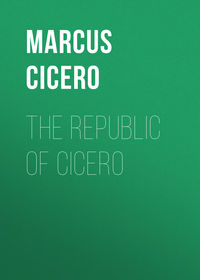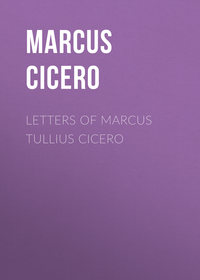 полная версия
полная версияThe Orations of Marcus Tullius Cicero, Volume 4
VI. But, since the republic has been now deprived of those men whom I have named, many and illustrious as they were, let us come to the living, since two of the men of consular rank are still left to us: Lucius Cotta, a man of the greatest genius and the most consummate prudence, proposed a supplication in my honour for those very actions with which you find fault, in the most complimentary language, and those very men of consular rank whom I have named, and the whole senate, adopted his proposal; an honour which has never been paid to any one else in the garb of peace from the foundation of the city to my time. With what eloquence, with what firm wisdom, with what a weight of authority did Lucius Caesar your uncle, pronounce his opinion against the husband of his own sister, your stepfather. But you, when you ought to have taken him as your adviser and tutor in all your designs, and in the whole conduct of your life, preferred being like your stepfather to resembling your uncle. I, who had no connexion with him, acted by his counsels while I was consul. Did you, who were his sister's son, ever once consult him on the affairs of the republic?
But who are they whom Antonius does consult? O ye immortal gods, they are men whose birthdays we have still to learn. To-day Antonius is not coming down. Why? He is celebrating the birthday feast at his villa. In whose honour? I will name no one. Suppose it is in honour of some Phormio, or Gnatho, or even Ballio.11 Oh the abominable profligacy of the man! Oh how intolerable is his impudence, his debauchery, and his lust! Can you, when you have one of the chiefs of the senate, a citizen of singular virtue, so nearly related to you, abstain from ever consulting him on the affairs of the republic, and consult men who have no property whatever of their own, and are draining yours?
VII. Yes, your consulship, forsooth, is a salutary one for the state, mine a mischievous one. Have you so entirely lost all shame as well as all chastity, that you could venture to say this in that temple in which I was consulting that senate which formerly in the full enjoyment of its honours presided over the world? And did you place around it abandoned men armed with swords? But you have dared besides (what is there which you would not dare?) to say that the Capitoline Hill, when I was consul, was full of armed slaves. I was offering violence to the senate, I suppose, in order to compel the adoption of those infamous decrees of the senate. O wretched man, whether those things are not known to you, (for you know nothing that is good,) or whether they are, when you dare to speak so shamelessly before such men! For what Roman knight was there, what youth of noble birth except you, what man of any rank or class who recollected that he was a citizen, who was not on the Capitoline Hill while the senate was assembled in this temple? who was there, who did not give in his name? Although there could not be provided checks enough, nor were the books able to contain their names.
In truth, when wicked men, being compelled by the revelations of the accomplices, by their own handwriting, and by what I may almost call the voices of their letters, were confessing that they had planned the parricidal destruction of their country, and that they had agreed to burn the city, to massacre the citizens, to devastate Italy, to destroy the republic; who could have existed without being roused to defend the common safety? especially when the senate and people of Rome had a leader then; and if they had one now like he was then, the same fate would befall you which did overtake them.
He asserts that the body of his stepfather was not allowed burial by me. But this is an assertion that was never made by Publius Clodius, a man whom, as I was deservedly an enemy of his, I grieve now to see surpassed by you in every sort of vice. But how could it occur to you to recal to our recollection that you had been educated in the house of Publius Lentulus? Were you afraid that we might think that you could have turned out as infamous as you are by the mere force of nature, if your natural qualities had not been strengthened by education?
VIII. But you are so senseless that throughout the whole of your speech you were at variance with yourself; so that you said things which had not only no coherence with each other but which were most inconsistent with and contradictory to one another; so that there was not so much opposition between you and me as there was between you and yourself. You confessed that your stepfather had been duplicated in that enormous wickedness, yet you complained that he had had punishment inflicted on him. And by doing so you praised what was peculiarly my achievement, and blamed that which was wholly the act of the senate. For the detection and arrest of the guilty parties was my work, their punishment was the work of the senate. But that eloquent man does not perceive that the man against whom he is speaking is being praised by him, and that those before whom he is speaking are being attacked by him. But now what an act, I will not say of audacity, (for he is anxious to be audacious,) but (and that is what he is not desirous of) what an act of folly, in which he surpasses all men, is it to make mention of the Capitoline Hill, at a time when armed men are actually between our benches—when men, armed with swords, are now stationed in this same temple of Concord, O ye immortal gods, in which, while I was consul, opinions most salutary to the state were delivered, owing to which it is that we are all alive at this day.
Accuse the senate; accuse the equestrian body, which at that time was united with the senate; accuse every order of society, and all the citizens, as long as you confess that this assembly at this very moment is besieged by Ityrean12 soldiers. It is not so much a proof of audacity to advance these statements so impudently, as of utter want of sense to be unable to see their contradictory nature. For what is more insane than, after you yourself have taken up arms to do mischief to the republic, to reproach another with having taken them up to secure its safety? On one occasion you attempted even to be witty. O ye good gods, how little did that attempt suit you! And yet you are a little to be blamed for your failure in that instance, too. For you might have got some wit from your wife, who was an actress. "Arms to the gown must yield." Well, have they not yielded? But afterwards the gown yielded to your arms. Let us inquire then whether it was better for the arms of wicked men to yield to the freedom of the Roman people, or that our liberty should yield to your arms. Nor will I make any further reply to you about the verses. I will only say briefly that you do not understand them, nor any other literature whatever. That I have never at any time been wanting to the claims that either the republic or my friends had upon me; but nevertheless that in all the different sorts of composition on which I have employed myself, during my leisure hours, I have always endeavoured to make my labours and my writings such as to be some advantage to our youth, and some credit to the Roman name. But, however, all this has nothing to do with the present occasion. Let us consider more important matters.
IX. You have said that Publius Clodius was slain by my contrivance. What would men have thought if he had been slain at the time when you pursued him in the forum with a drawn sword, in the sight of all the Roman people; and when you would have settled his business if he had not thrown himself up the stairs of a bookseller's shop, and, shutting them against you, checked your attack by that means? And I confess that at that time I favoured you, but even you yourself do not say that I had advised your attempt. But as for Milo, it was not possible even for me to favour his action. For he had finished the business before any one could suspect that he was going to do it. Oh, but I advised it. I suppose Milo was a man of such a disposition that he was not able to do a service to the republic if he had not some one to advise him to do it. But I rejoiced at it. Well, suppose I did; was I to be the only sorrowful person in the city, when every one else was in such delight? Although that inquiry into the death of Publius Clodius was not instituted with any great wisdom. For what was the reason for having a new law to inquire into the conduct of the man who had slain him, when there was a form of inquiry already established by the laws? However, an inquiry was instituted. And have you now been found, so many years afterwards, to say a thing which, at the time that the affair was under discussion, no one ventured to say against me? But as to the assertion that you have dared to make, and that at great length too, that it was by my means that Pompeius was alienated from his friendship with Caesar, and that on that account it was my fault that the civil war was originated; in that you have not erred so much in the main facts, as (and that is of the greatest importance) in the times.
X. When Marcus Bibulus, a most illustrious citizen, was consul, I omitted nothing which I could possibly do or attempt to draw off Pompeius from his union with Caesar. In which, however, Caesar was more fortunate than I, for he himself drew off Pompeius from his intimacy with me. But afterwards, when Pompeius joined Caesar with all his heart, what could have been my object in attempting to separate them then? It would have been the part of a fool to hope to do so, and of an impudent man to advise it. However, two occasions did arise, on which I gave Pompeius advice against Caesar. You are at liberty to find fault with my conduct on those occasions if you can. One was when I advised him not to continue Caesar's government for five years more. The other, when I advised him not to permit him to be considered as a candidate for the consulship when he was absent. And if I had been able to prevail on him in either of these particulars, we should never have fallen into our present miseries.
Moreover, I also, when Pompeius had now devoted to the service of Caesar all his own power, and all the power of the Roman people, and had begun when it was too late to perceive all those things which I had foreseen long before, and when I saw that a nefarious war was about to be waged against our country, I never ceased to be the adviser of peace, and concord, and some arrangement. And that language of mine was well known to many people,—"I wish, O Cnaeus Pompeius, that you had either never joined in a confederacy with Caius Caesar, or else that you had never broken it off. The one conduct would have become your dignity, and the other would have been suited to your prudence." This, O Marcus Antonius, was at all times my advice both respecting Pompeius and concerning the republic. And if it had prevailed, the republic would still be standing, and you would have perished through your own crimes, and indigence, and infamy.
XI. But these are all old stories now. This charge, however, is quite a modern one, that Caesar was slain by my contrivance. I am afraid, O conscript fathers, lest I should appear to you to have brought up a sham accuser against myself (which is a most disgraceful thing to do); a man not only to distinguish me by the praises which are my due, but to load me also with those which do not belong to me. For who ever heard my name mentioned as an accomplice in that most glorious action? and whose name has been concealed who was in the number of that gallant band? Concealed, do I say? Whose name was there which was not at once made public? I should sooner say that some men had boasted in order to appear to have been concerned in that conspiracy, though they had in reality known nothing of it, than that any one who had been an accomplice in it could have wished to be concealed. Moreover, how likely it is, that among such a number of men, some obscure, some young men who had not the wit to conceal any one, my name could possibly have escaped notice! Indeed, if leaders were wanted for the purpose of delivering the country, what need was there of my instigating the Bruti, one of whom saw every day in his house the image of Lucius Brutus, and the other saw also the image of Ahala? Were these the men to seek counsel from the ancestors of others rather than from their own? and out of doors rather than at home? What? Caius Cassius, a man of that family which could not endure, I will not say the domination, but even the power of any individual,—he, I suppose, was in need of me to instigate him? a man who, even without the assistance of these other most illustrious men, would have accomplished this same deed in Cilicia, at the mouth of the river Cydnus, if Caesar had brought his ships to that bank of the river which he had intended, and not to the opposite one. Was Cnaeus Domitius spurred on to seek to recover his dignity, not by the death of his father, a most illustrious man, nor by the death of his uncle, nor by the deprivation of his own dignity, but by my advice and authority? Did I persuade Caius Trebonius? a man whom I should not have ventured even to advise. On which account the republic owes him even a larger debt of gratitude, because he preferred the liberty of the Roman people to the friendship of one man, and because he preferred overthrowing arbitrary power to sharing it. Was I the instigator whom Lucius Tillius Cimber followed? a man whom I admired for having performed that action, rather than ever expected that he would perform it; and I admired him on this account, that he was unmindful of the personal kindnesses which he had received, but mindful of his country. What shall I say of the two Servilii? Shall I call them Cascas, or Ahalas? and do you think that those men were instigated by my authority rather than by their affection for the republic? It would take a long time to go through all the rest; and it is a glorious thing for the republic that they were so numerous, and a most honourable thing also for themselves.
XII. But recollect, I pray you, how that clever man convicted me of being an accomplice in the business. When Caesar was slain, says he, Marcus Brutus immediately lifted up on high his bloody dagger, and called on Cicero by name; and congratulated him on liberty being recovered. Why on me above all men? Because I knew of it beforehand? Consider rather whether this was not his reason for calling on me, that, when he had performed an action very like those which I myself had done, he called me above all men to witness that he had been an imitator of my exploits. But you, O stupidest of all men, do not you perceive, that if it is a crime to have wished that Caesar should be slain—which you accuse me of having wished—it is a crime also to have rejoiced at his death? For what is the difference between a man who has advised an action, and one who has approved of it? or what does it signify whether I wished it to be done, or rejoice that it has been done? Is there any one then, except you yourself and those men who wished him to become a king, who was unwilling that that deed should be done, or who disapproved of it after it was done? All men, therefore, are guilty as far as this goes. In truth, all good men, as far as it depended on them, bore a part in the slaying of Caesar. Some did not know how to contrive it, some had not courage for it, some had no opportunity,—every one had the inclination.
However, remark the stupidity of this fellow,—I should rather say, of this brute beast. For thus he spoke:—"Marcus Brutus, whom I name to do him honour, holding aloft his bloody dagger, called upon Cicero, from which it must be understood that he was privy to the action." Am I then called wicked by you because you suspect that I suspected something; and is he who openly displayed his reeking dagger, named by you that you may do him honour? Be it so. Let this stupidity exist in your language: how much greater is it in your actions and opinions! Arrange matters in this way at last, O consul; pronounce the cause of the Bruti, of Caius Cassius, of Cnaeus Domitius, of Caius Trebonius and the rest to be whatever you please to call it: sleep off that intoxication of yours, sleep it off and take breath. Must one apply a torch to you to waken you while you are sleeping over such an important affair? Will you never understand that you have to decide whether those men who performed that action are homicides or assertors of freedom?
XIII. For just consider a little; and for a moment think of the business like a sober man. I who, as I myself confess, am an intimate friend of those men, and, as you accuse me, an accomplice of theirs, deny that there is any medium between these alternatives. I confess that they, if they be not deliverers of the Roman people and saviours of the republic, are worse than assassins, worse than homicides, worse even than parricides: since it is a more atrocious thing to murder the father of one's country, than one's own father. You wise and considerate man, what do you say to this? If they are parricides, why are they always named by you, both in this assembly and before the Roman people, with a view to do them honour? Why has Marcus Brutus13 been, on your motion, excused from obedience to the laws, and allowed to be absent. Why were the games of Apollo celebrated with incredible honour to Marcus Brutus? why were provinces given to Brutus and Cassius? why were quaestors assigned to them? why was the number of their lieutenants augmented? And all these measures were owing to you. They are not homicides then. It follows that in your opinion they are deliverers of their country, since there can be no other alternative. What is the matter? Am I embarrassing you? For perhaps you do not quite understand propositions which are stated disjunctively. Still this is the sum total of my conclusion; that since they are acquitted by you of wickedness, they are at the same time pronounced most worthy of the very most honourable rewards.
Therefore, I will now proceed again with my oration. I will write to them, if any one by chance should ask whether what you have imputed to me be true, not to deny it to any one. In truth, I am afraid that it must be considered either a not very creditable thing to them, that they should have concealed the fact of my being an accomplice; or else a most discreditable one to me that I was invited to be one, and that I shirked it. For what greater exploit (I call you to witness, O august Jupiter!) was ever achieved not only in this city, but in all the earth? What more glorious action was ever done? What deed was ever more deservedly recommended to the everlasting recollection of men? Do you, then, shut me up with the other leaders in the partnership in this design, as in the Trojan horse? I have no objection; I even thank you for doing so, with whatever intent you do it. For the deed is so great an one, that I cannot compare the unpopularity which you wish to excite against me on account of it, with its real glory.
For who can be happier than those men whom you boast of having now expelled and driven from the city? What place is there either so deserted or so uncivilized, as not to seem to greet and to covet the presence of those men wherever they have arrived? What men are so clownish as not, when they have once beheld them, to think that they have reaped the greatest enjoyment that life can give? And what posterity will be ever so forgetful, what literature will ever be found so ungrateful, as not to cherish their glory with undying recollection? Enrol me then, I beg, in the number of those men.
XIV. But one thing I am afraid you may not approve of. For if I had really been one of their number, I should have not only got rid of the king, but of the kingly power also out of the republic; and if I had been the author of the piece, as it is said, believe me, I should not have been contented with one act, but should have finished the whole play. Although, if it be a crime to have wished that Caesar might be put to death, beware, I pray you, O Antonius, of what must be your own case, as it is notorious that you, when at Narbo, formed a plan of the same sort with Caius Trebonius; and it was on account of your participation in that design that, when Caesar was being killed, we saw you called aside by Trebonius. But I (see how far I am from any horrible inclination towards,) praise you for having once in your life had a righteous intention; I return you thanks for not having revealed the matter; and I excuse you for not having accomplished your purpose. That exploit required a man.
And if any one should institute a prosecution against you, and employ that test of old Cassius, "who reaped any advantage from it?" take care, I advise you, lest you suit that description. Although, in truth, that action was, as you used to say, an advantage to every one who was not willing to be a slave, still it was so to you above all men, who are not merely not a slave, but are actually a king; who delivered yourself from an enormous burden of debt at the temple of Ops; who, by your dealings with the account books, there squandered a countless sum of money; who have had such vast treasures brought to you from Caesar's house; at whose own house there is set up a most lucrative manufactory of false memoranda and autographs, and a most iniquitous market of lands, and towns, and exemptions, and revenues. In truth, what measure except the death of Caesar could possibly have been any relief to your indigent and insolvent condition? You appear to be somewhat agitated. Have you any secret fear that you yourself may appear to have had some connexion with that crime? I will release you from all apprehension; no one will ever believe it; it is not like you to deserve well of the republic; the most illustrious men in the republic are the authors of that exploit; I only say that you are glad it was done; I do not accuse you of having done it. I have replied to your heaviest accusations, I must now also reply to the rest of them.
XV. You have thrown in my teeth the camp of Pompeius and all my conduct at that time. At which time, indeed, if, as I have said before, my counsels and my authority had prevailed, you would this day be in indigence, we should be free, and the republic would not have lost so many generals and so many armies. For I confess that, when I saw that these things certainly would happen, which now have happened, I was as greatly grieved as all the other virtuous citizens would have been if they had foreseen the same things. I did grieve, I did grieve, O conscript fathers, that the republic which had once been saved by your counsels and mine, was fated to perish in a short time. Nor was I so inexperienced in and ignorant of this nature of things, as to be disheartened on account of a fondness for life, which while it endured would wear me out with anguish, and when brought to an end would release me from all trouble. But I was desirous that those most illustrious men, the lights of the republic, should live: so many men of consular rank, so many men of praetorian rank, so many most honourable senators; and besides them all the flower of our nobility and of our youth; and the armies of excellent citizens. And if they were still alive, under ever such hard conditions of peace, (for any sort of peace with our fellow-citizens appeared to me more desirable than civil war,) we should be still this day enjoying the republic.
And if my opinion had prevailed, and if those men, the preservation of whose lives was my main object, elated with the hope of victory, had not been my chief opposers, to say nothing of other results, at all events you would never have continued in this order, or rather in this city. But say you, my speech alienated from me the regard of Pompeius? Was there any one to whom he was more attached? any one with whom he conversed or shared his counsels more frequently? It was, indeed, a great thing that we, differing as we did respecting the general interests of the republic, should continue in uninterrupted friendship. But I saw clearly what his opinions and views were, and he saw mine equally. I was for providing for the safety of the citizens in the first place, in order that we might be able to consult their dignity afterwards. He thought more of consulting their existing dignity. But because each of us had a definite object to pursue, our disagreement was the more endurable. But what that extraordinary and almost godlike man thought of me is known to those men who pursued him to Paphos from the battle of Pharsalia. No mention of me was ever made by him that was not the most honourable that could be, that was not full of the most friendly regret for me; while he confessed that I had had the most foresight, but that he had had more sanguine hopes. And do you dare taunt me with the name of that man whose friend you admit that I was, and whose assassin you confess yourself?









